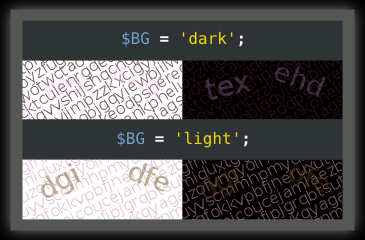Here's a custom image captcha I just made. What's cool about it is that it's transparent (PNG), so it 'blends' into the background. To suit different backgrounds, it has two settings - dark and light - which you set according to the background color of the page you want to put it on. Here's a picture that demonstrates this; you can see that the captcha is completely unreadable when put on the wrong background, but completely readable when it's right:

Here's the code:
<?php
$W = 160; // width
$H = 60; // height
$L = 6; // length of the key
$BG = 'light'; // can be 'light' or 'dark', accorting to the background color of
// the page it will be on
$F = './DejaVuSans.ttf'; // path to true-type font file
function makeKey($length) {
// generate a random sequence of characters
$a = 'abcdefghijklmnopqrstuvwxyz';
$s = '';
for ($i=0; $i < $length; $i++) {
$s .= $a[mt_rand(0, strlen($a) - 1)];
}
return $s;
}
$img = imagecreatetruecolor($W, $H);
// make the image alpha-aware
imagesavealpha($img, true);
// make colors 'blend', not overwrite
imagealphablending($img, true);
// make the image transparent
imagefill($img, 1, 1, imagecolorallocatealpha($img, 0, 0, 0, 127));
// generate two random colors and decide which one goes where
$dark = Array (mt_rand(0, 126), mt_rand(0, 126), mt_rand(0, 126));
$light = Array (mt_rand(127, 255), mt_rand(127, 255), mt_rand(127, 255));
if ($BG == 'dark') {
$bg_color = imagecolorallocatealpha($img, $dark[0], $dark[1], $dark[2], mt_rand(64, 96));
$fg_color = imagecolorallocatealpha($img, $light[0], $light[1], $light[2], mt_rand(32, 64));
}
else {
$bg_color = imagecolorallocatealpha($img, $light[0], $light[1], $light[2], mt_rand(64, 96));
$fg_color = imagecolorallocatealpha($img, $dark[0], $dark[1], $dark[2], mt_rand(32, 64));
}
// write background static
$angle = mt_rand(20, 35);
for ($i=0; $i < 15; $i++) {
imagettftext($img, 12, $angle, 0, $i*15, $bg_color, $F, makeKey(30));
}
$key = makeKey($L); // you should store this in the user session to check it later
// write the actual key, in two parts
imagettftext($img, mt_rand(16, 22), mt_rand(10, 30), mt_rand(5, 30), mt_rand($H-16, $H-22), $fg_color, $F, substr($key, 0, 3));
imagettftext($img, mt_rand(16, 22), mt_rand(-30, -10), mt_rand($W/2+5, $W/2+30), mt_rand(16, 22), $fg_color, $F, substr($key, 3, 3));
// output the image
header("Content-Type: image/png");
imagepng($img);
?>
On my machine (Pentium DualCore @ 2.80Ghz) it generates images in 70-75ms. I think that's pretty fair. Also, it works with non-bundled GD versions, too, so you don't have to worry about that. Enjoy.
 Here's the code:
Here's the code:

This is kind of a waste to have here, nothing else explained. I spent 10 minutes on it and went with a different route. Easy code those...
ReplyDeleteYou should put directions on how to use this, I created a captcha.php and added it to my page via img src pointing to the php file but there is no way to transfer the session variables from the page that I can see but I am not a pro on php.
Just a word of advice, have a good one!
You're supposed to modify the code. Right after the $key = makeKey($L) call, you can store $key wherever you want -- like a session, and use it afterwards for checking.
ReplyDeletegümüşhane
ReplyDeletebilecik
erzincan
nevşehir
niğde
S72KH5